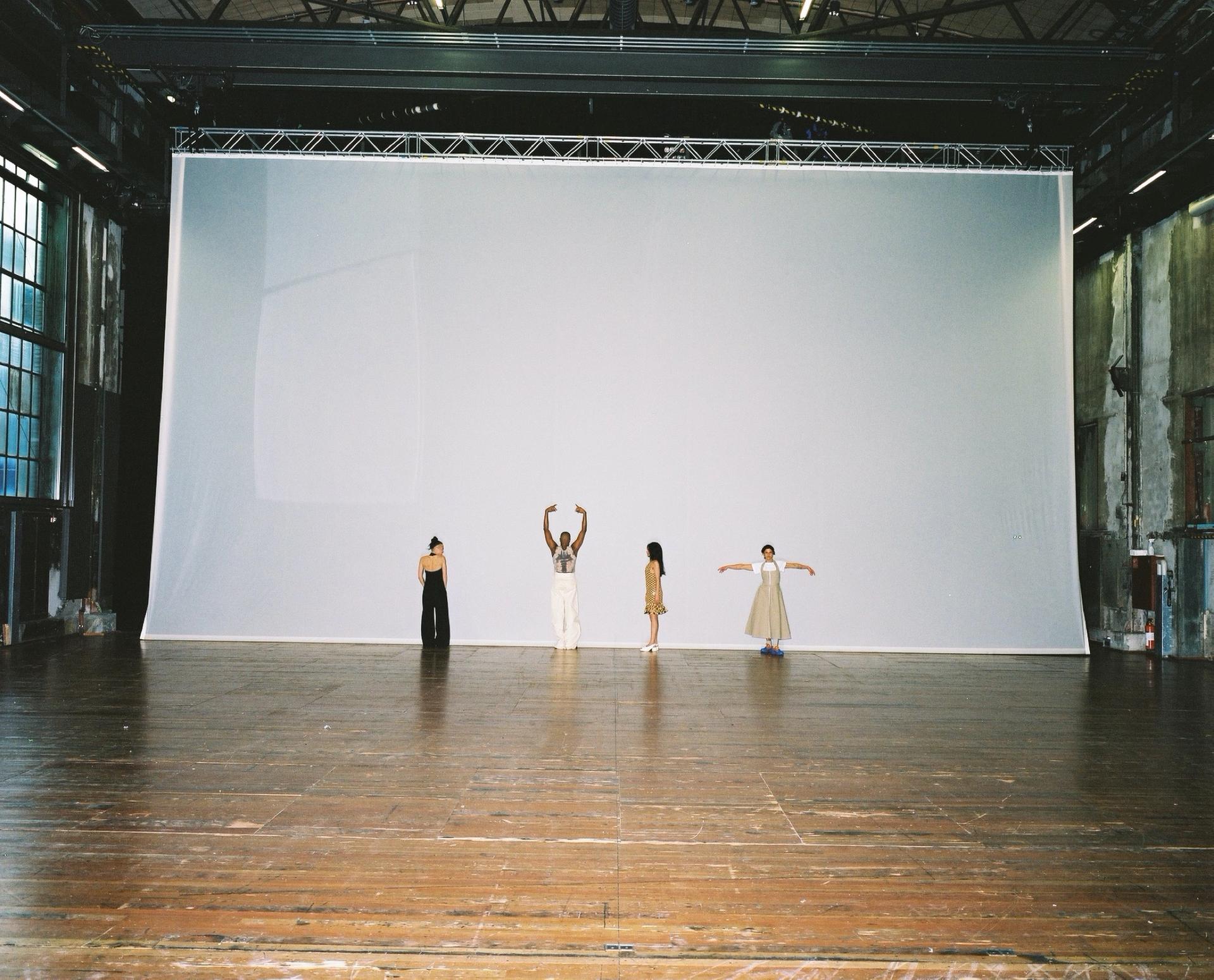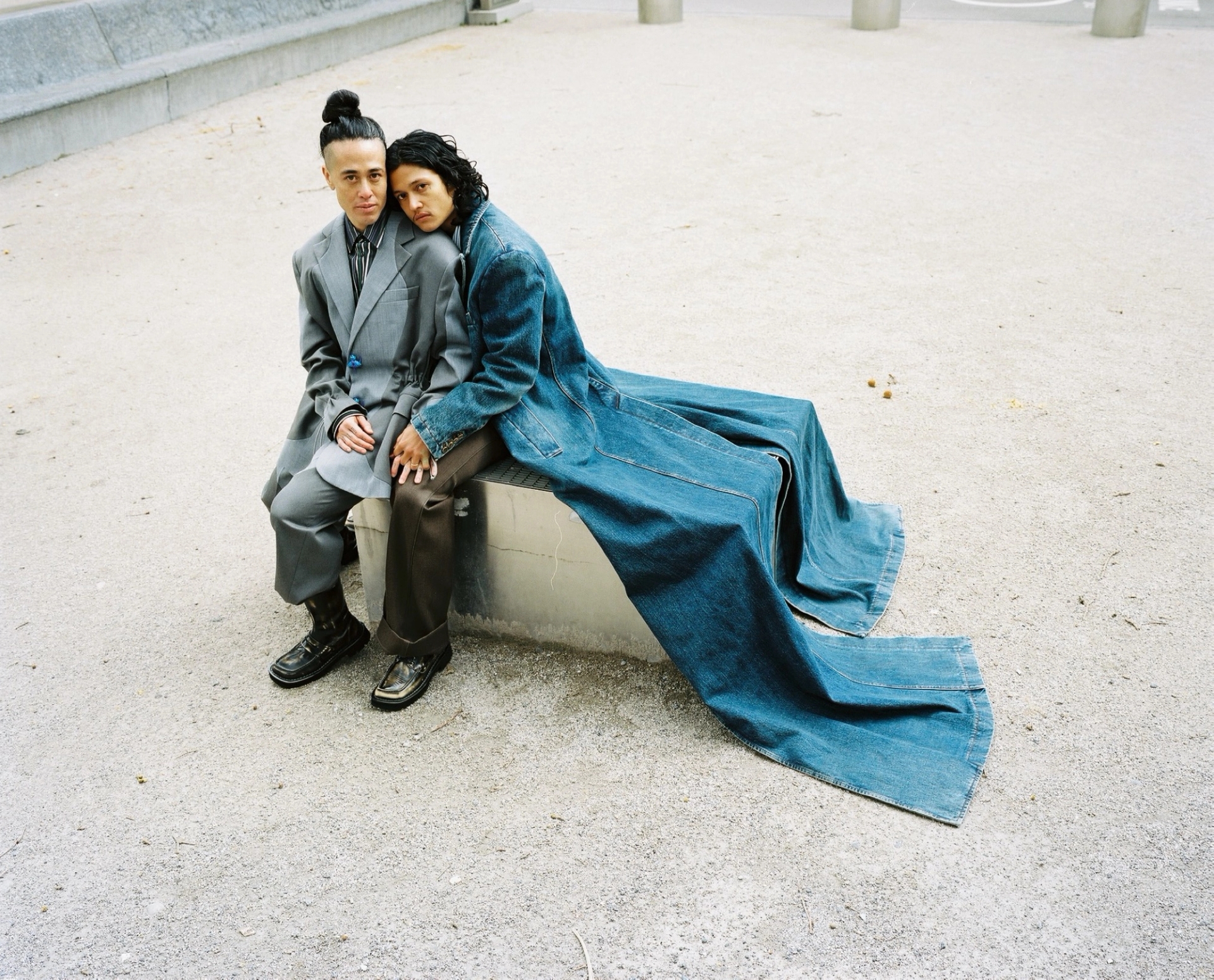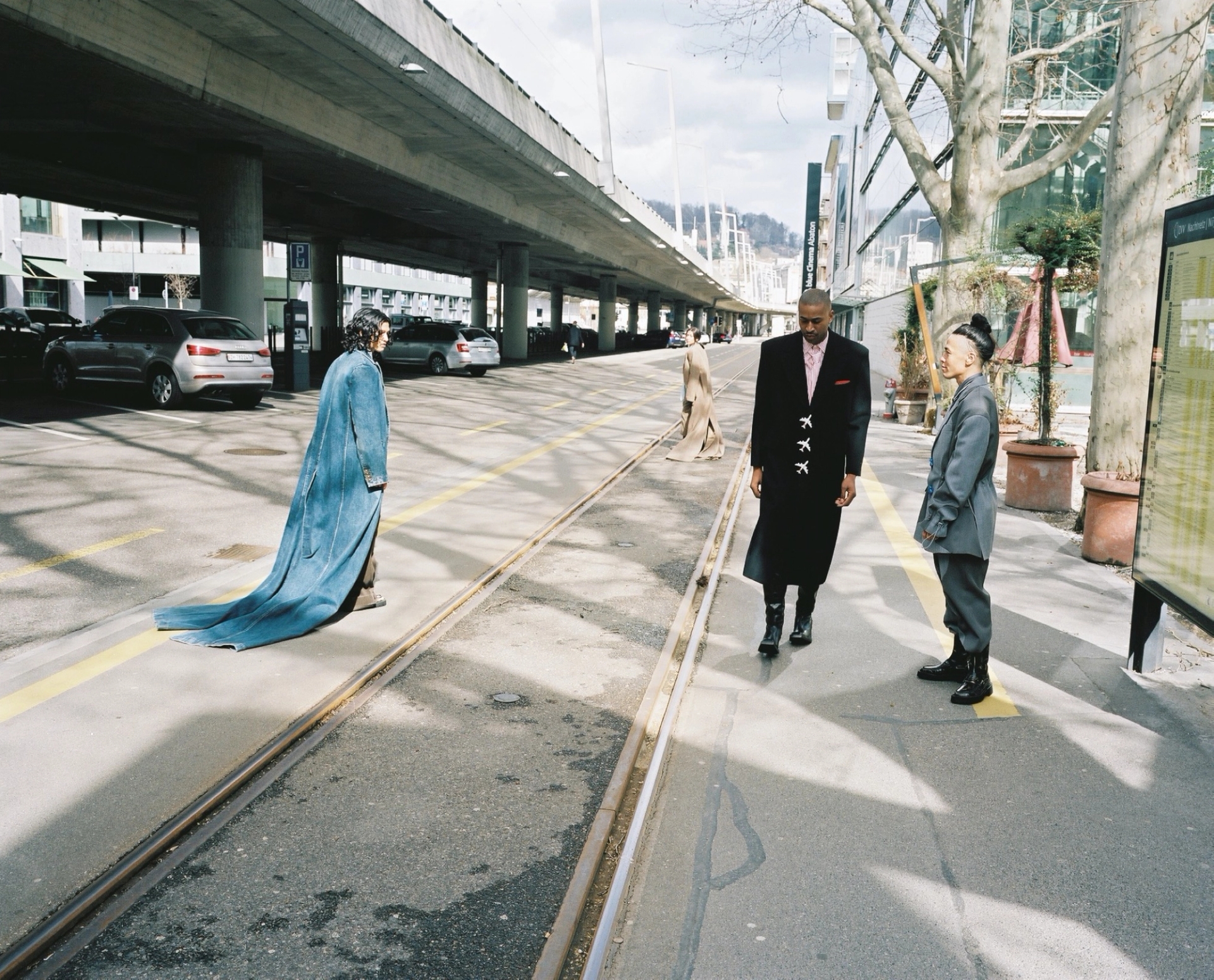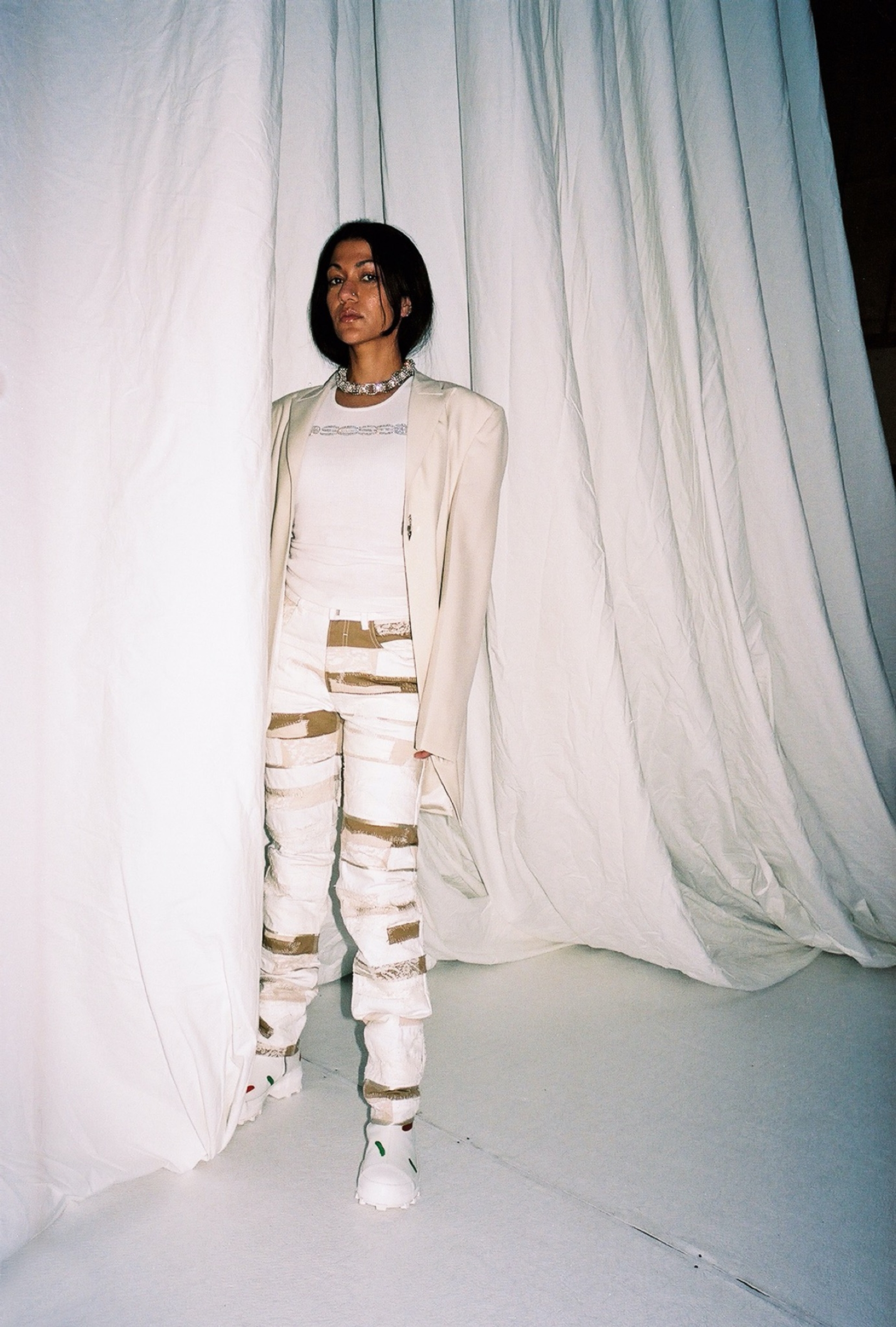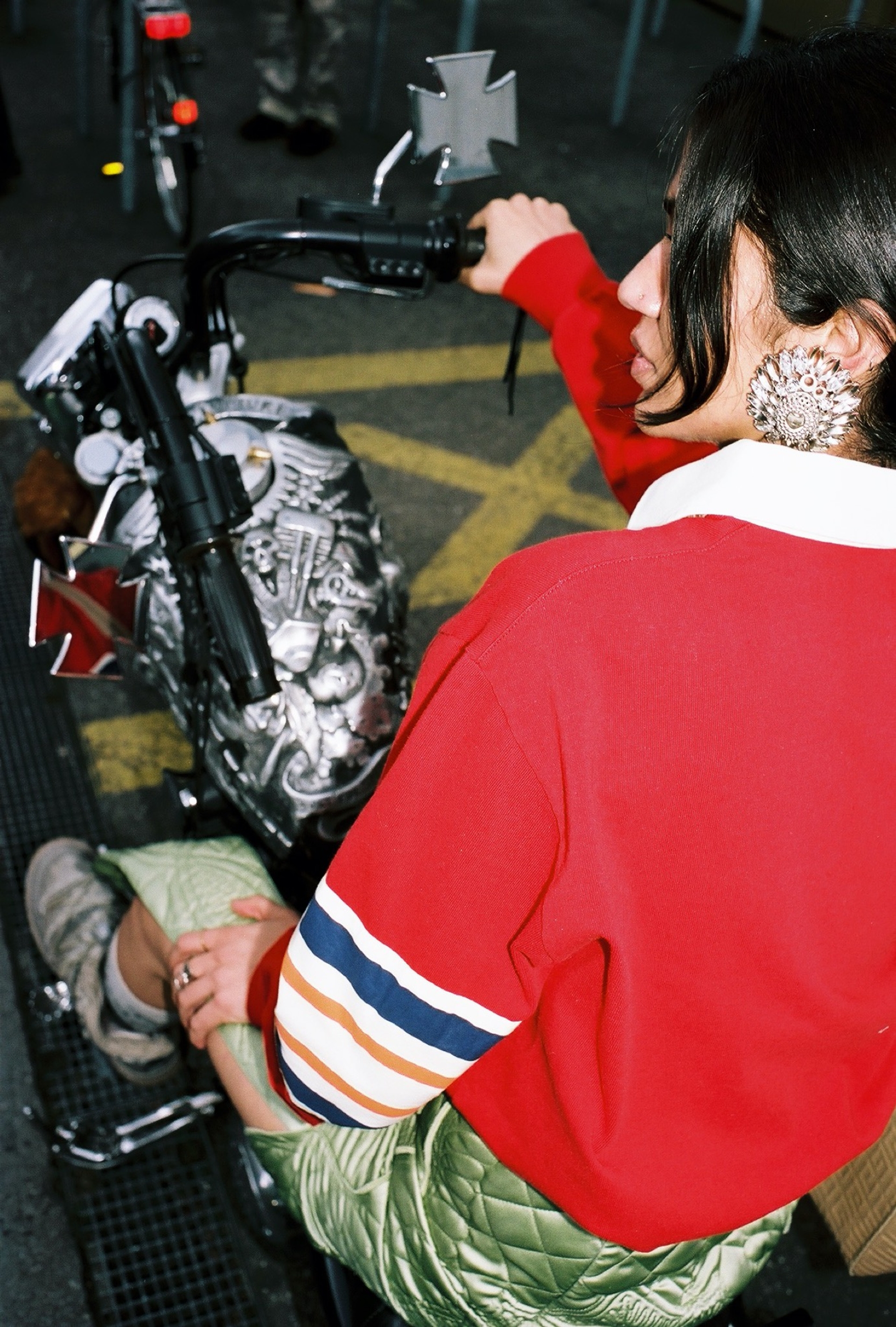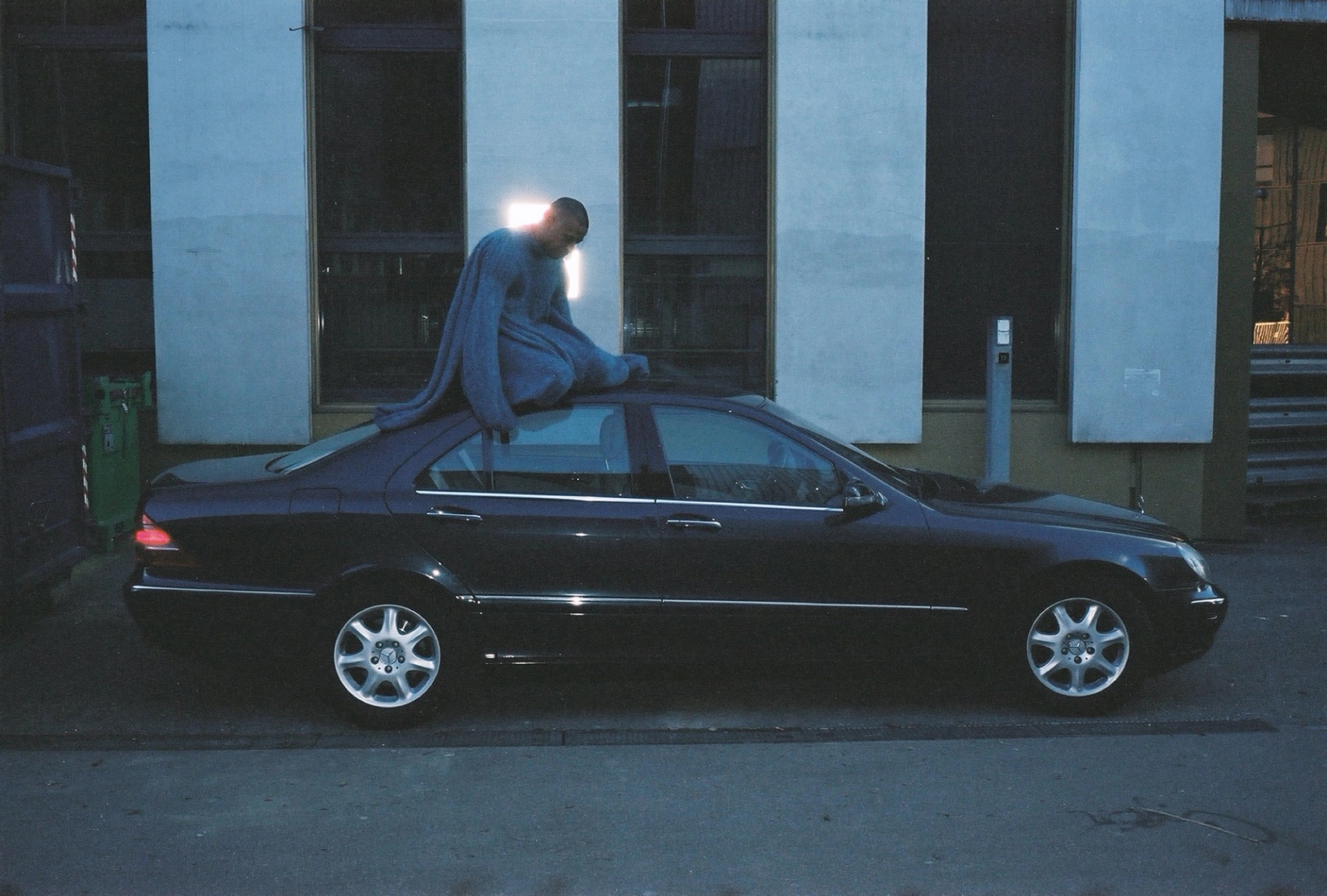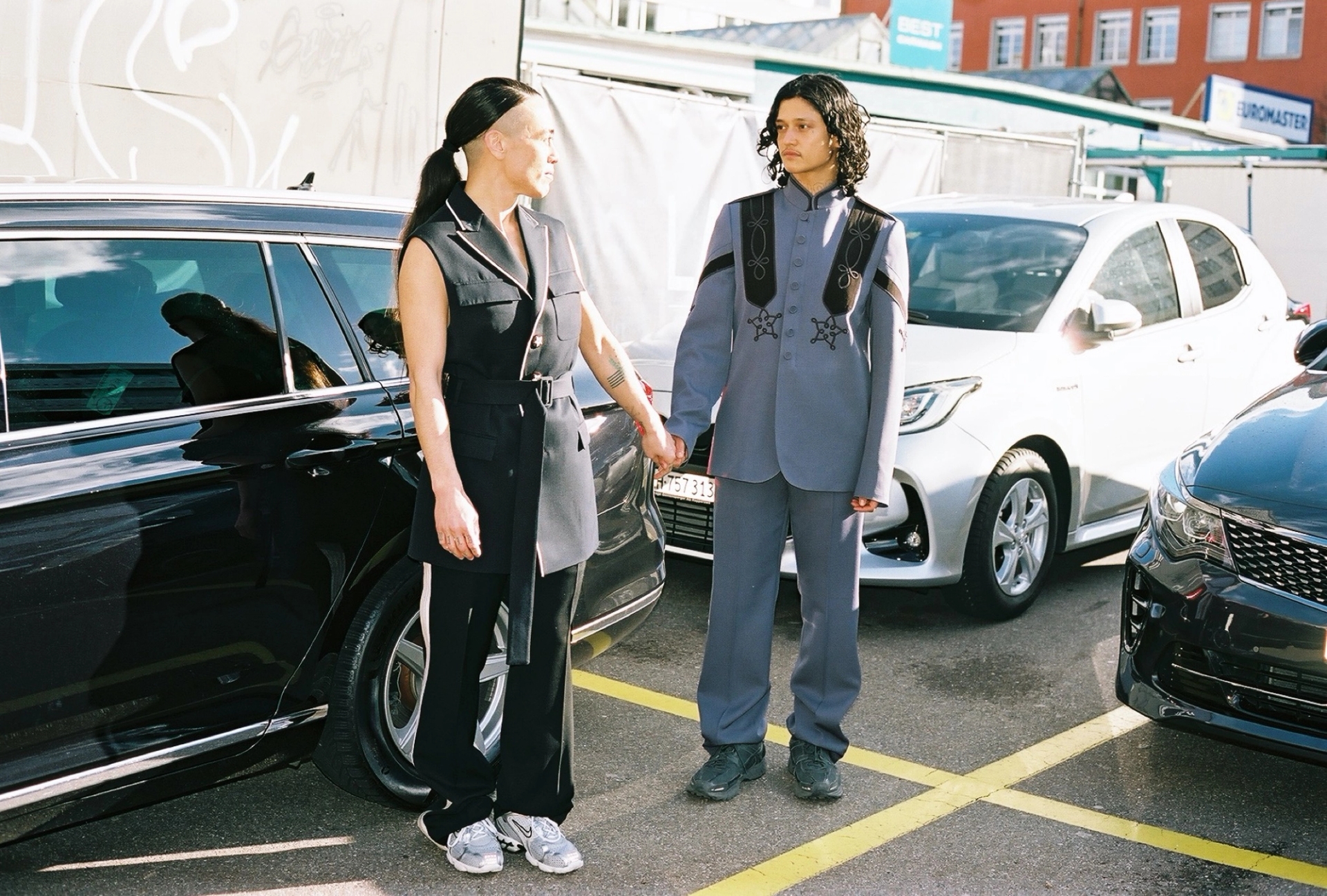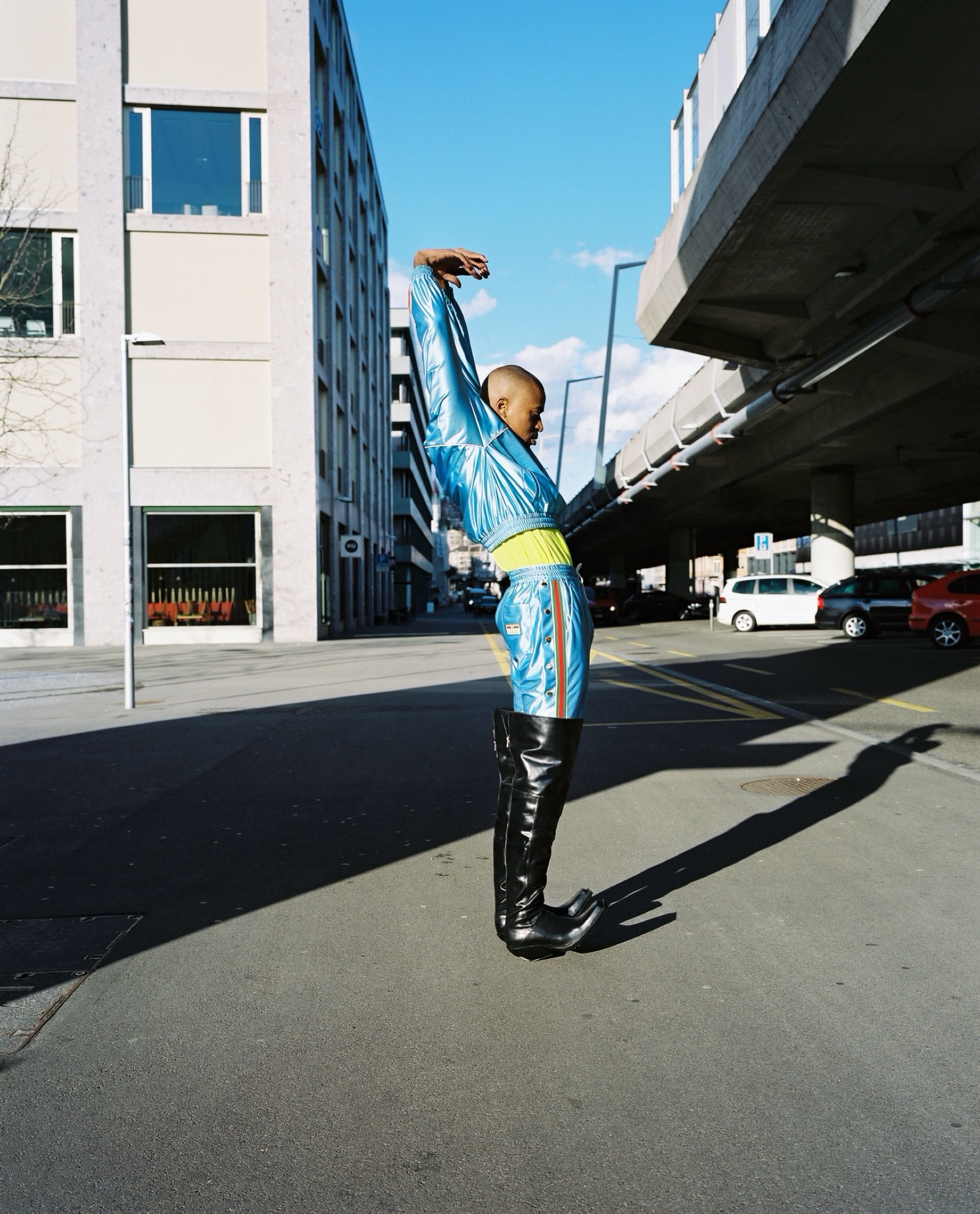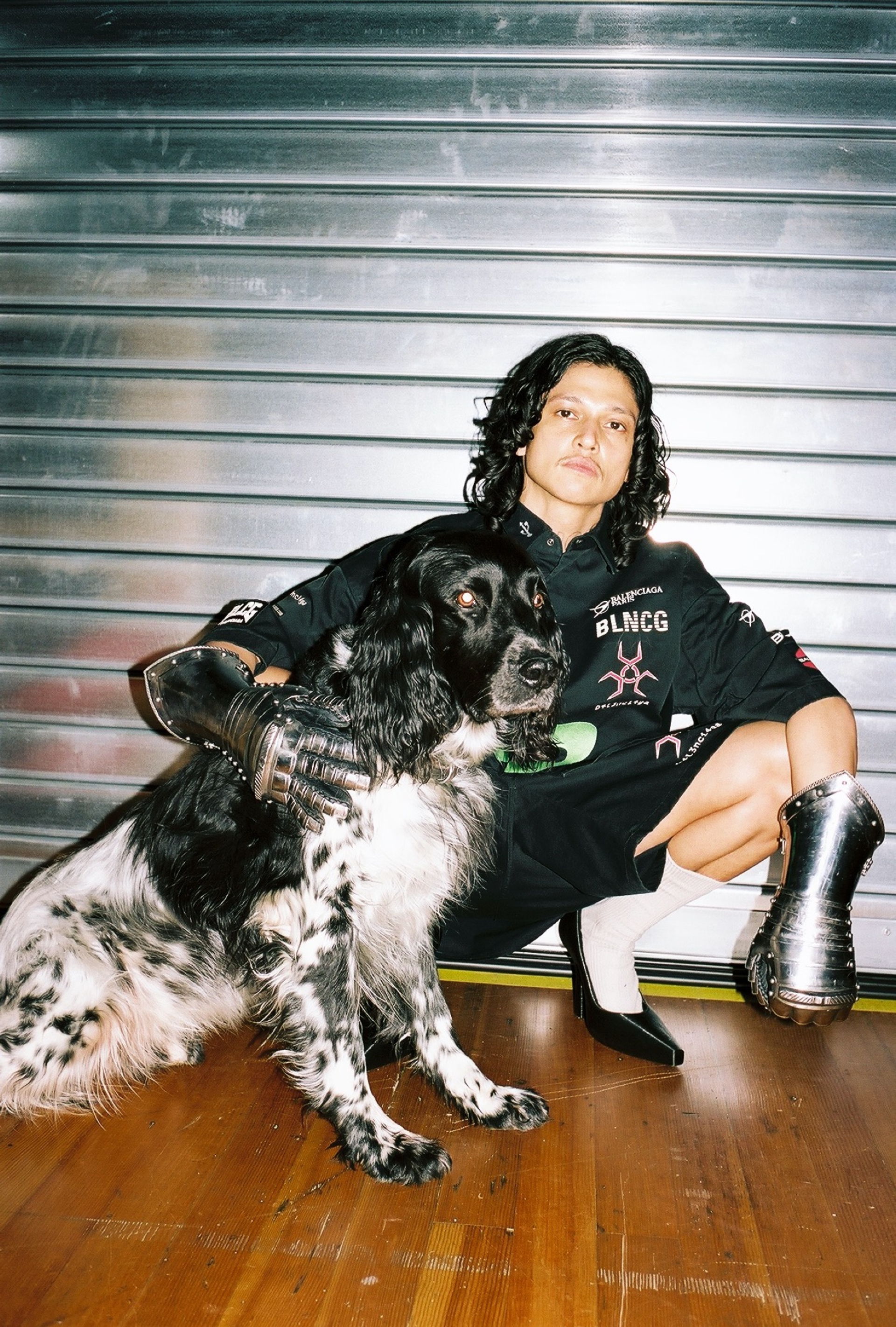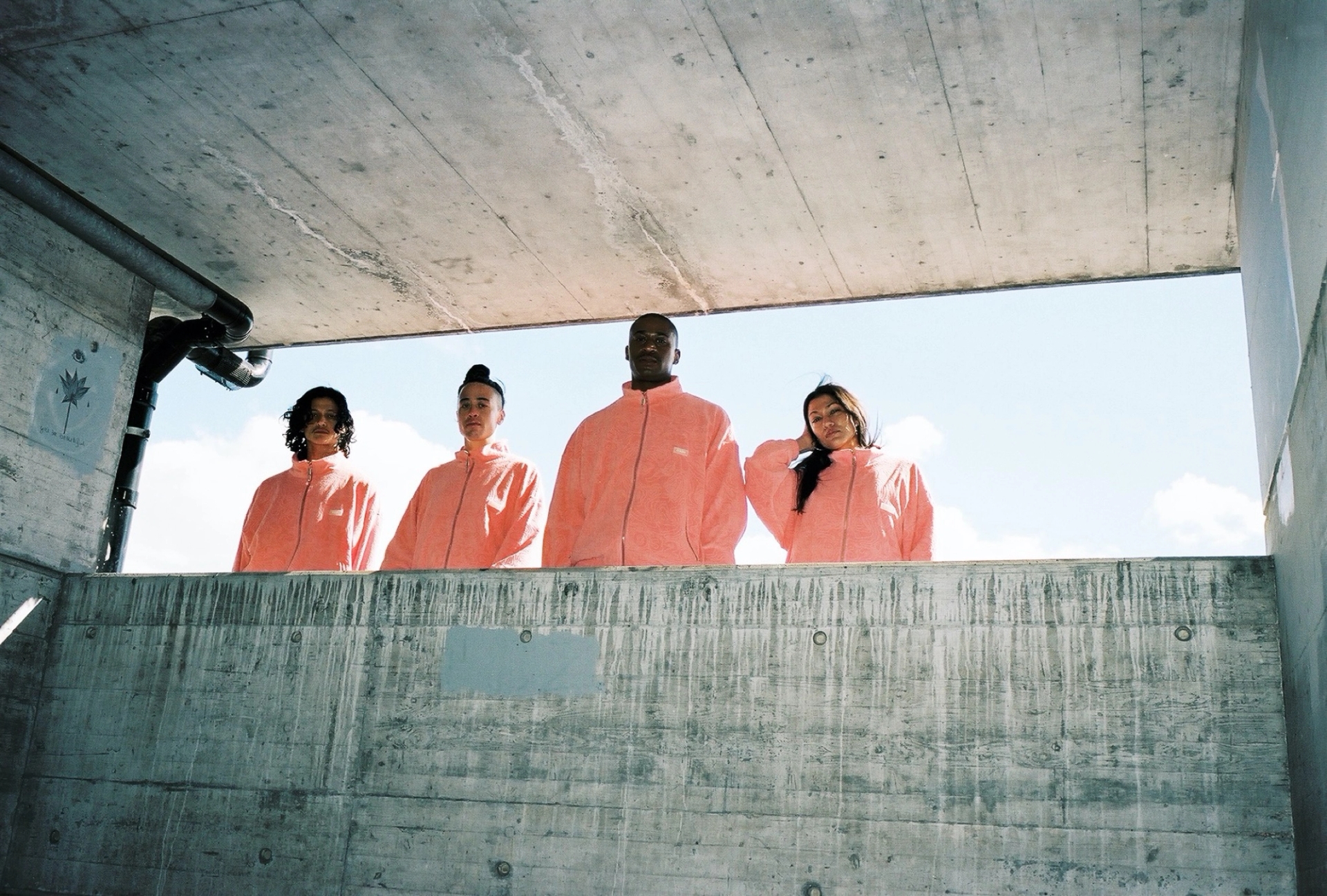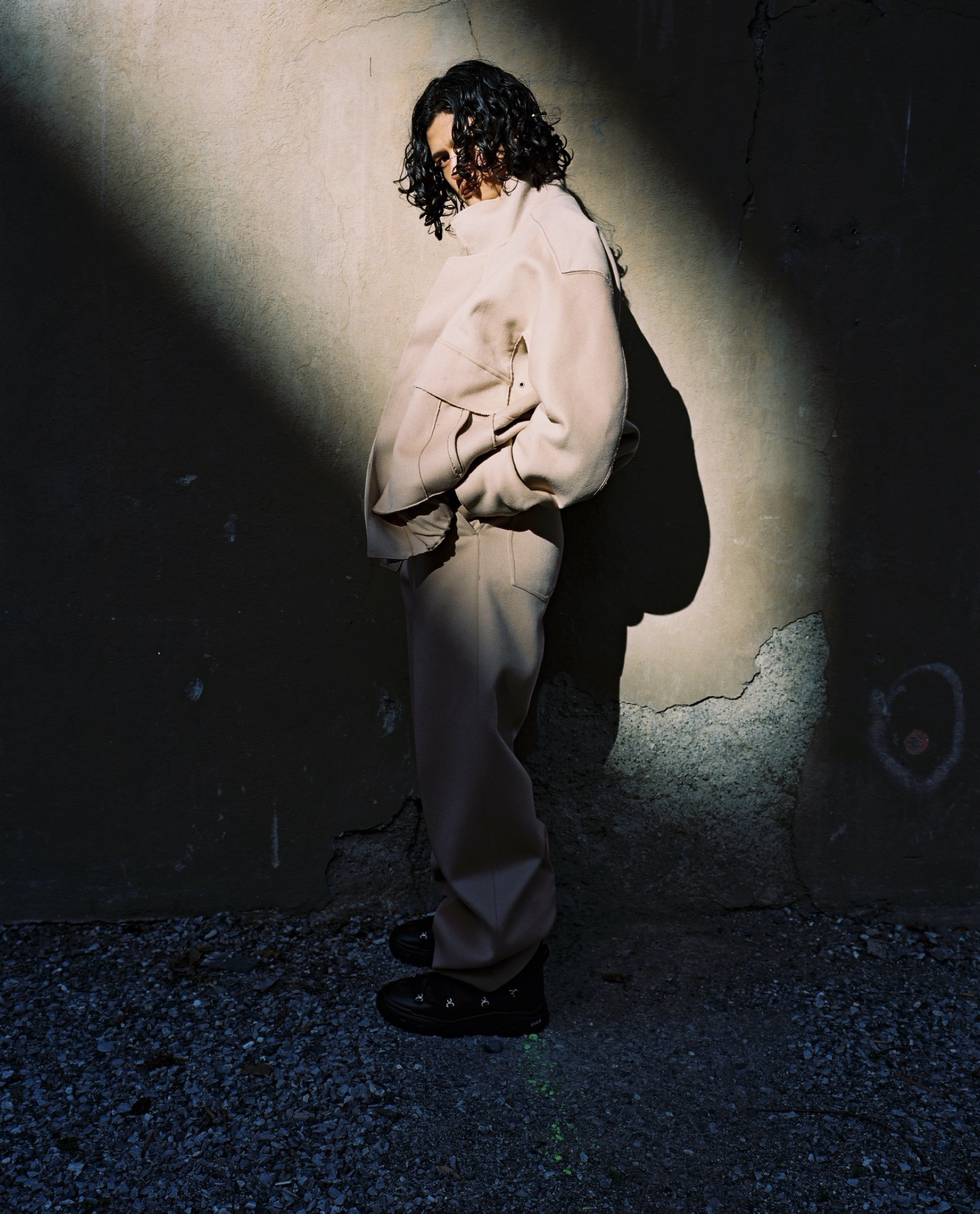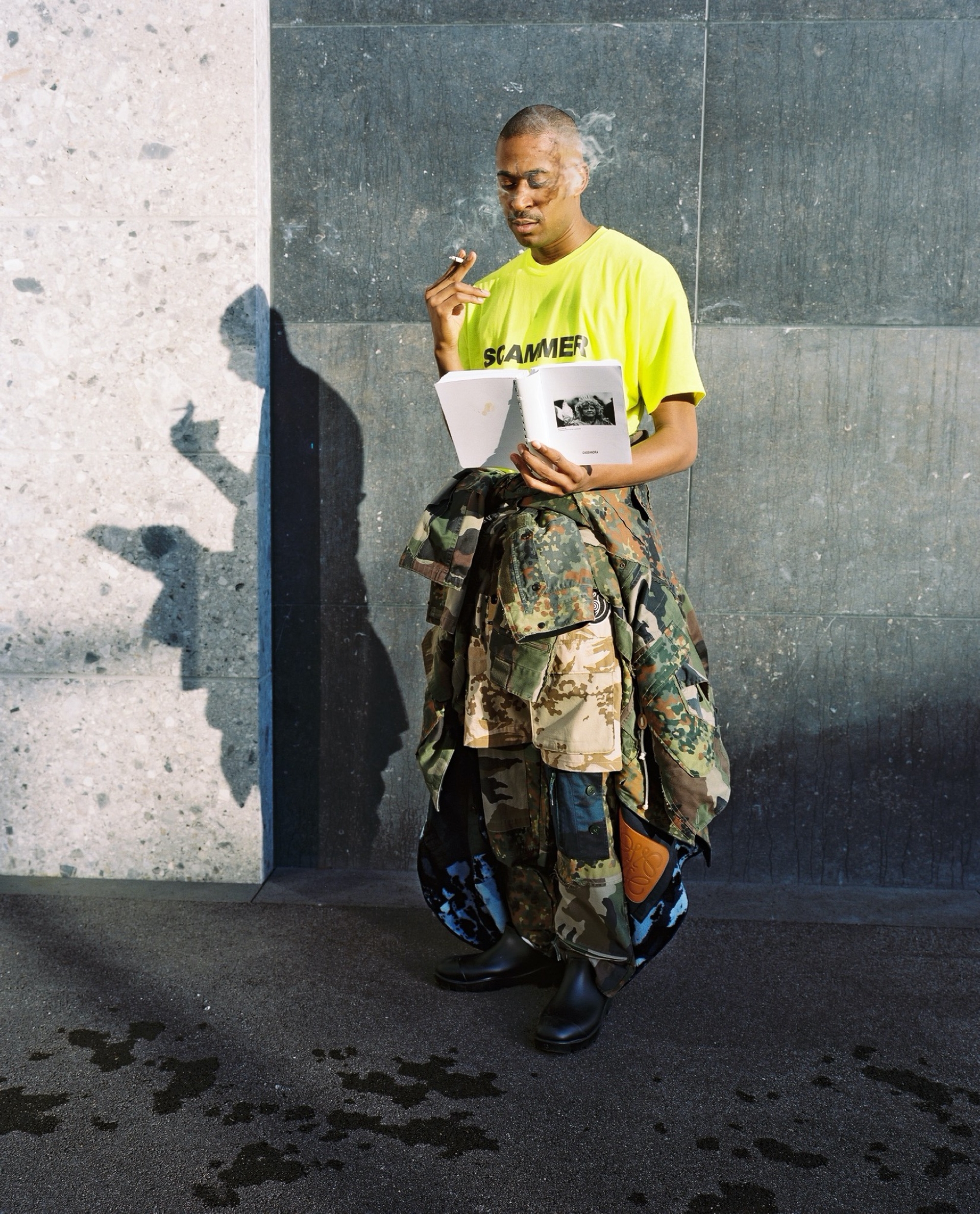Moved by the Motion: A Portrait of a Roving Band, in Five Acts
Among the list of artists participating in the 2022 Whitney Biennial are MOVED BY THE MOTION, a “roving band” whose artist-members play their varied disciplines like bandmates play their instruments. Together, in something they call “concentration,” they seek understanding and amplification – of their own practices and each other’s, and of the meaning and medium of performance. Columnist Jordan Richman profiled the troupe in the form of a five act play.
SYNOPSIS
Before Moved by the Motion, there is Wildness, a weekly party founded by Wu Tsang in 2007 and held at the Silver Platter in LA. Wu, a filmmaker, does not yet know that the party will shape a life of collaboration – that the story of Wildness will become one of possibility and community, of cosmic connection. Once upon a Wildness, musician Asma Maroof enters, scene right, and meets Wu. Tosh Basco, a performance artist, meets Wu in the City of Angels, too. One day she asks Wu to tell her a story, and Tosh tells the story back to Wu in movement, instead of using pictures and words. This is where the name Moved by the Motion originates. Wu and Tosh begin to collaborate, making performances together. Soon they meet Josh Johnson, another dancer, who is visiting LA, the hometown he left at 17. They also meet Patrick Belaga, a cellist, who like Josh is classically trained – and hoping to forget what he had been taught. They all want to make something new. One day Wu, Tosh, and Josh make a film with Fred Moten and shoot it in his backyard. Fred, a poet, sees them together and decides to refer to the group as “the band.” He is the first person to describe Moved by the Motion that way. Moved by the Motion becomes a band that “explores how ideas of Black, queer, and trans identities are intertwined and constantly in formation” – and that is in constant formation itself. Its members work on projects around the world, but always find ways to work together, too.
Home is a complicated thing when you are “roving.”
suit, jackets, shirts, and pants LOUIS VUITTON shoes CAMPER
suits, coats, shirts, and pants LOUIS VUITTON shoes CAMPER boots I S E STUDIO
Wu is approached by a theater called the Schauspielhaus Zürich, which invites her to Switzerland as artistic director in residence. It is a dream scenario, so she agrees. Moved by the Motion comes with her. In Zurich, they go deep together – and frequently host other collaborators, always expanding the group. With new bandmates Kandis Williams, an artist and publisher, and Sophia Al Maria, an artist and screenwriter, Moved by the Motion makes a film for Louis Vuitton’s Fall 2021 Menswear collection. Informed by James Baldwin’s essay “Stranger in the Village,” the film explores “themes of origin and ownership through the figurative notion of the art heist.” They call it Peculiar Contrast, Perfect Light. At the Schauspielhaus, Moved by the Motion works on a production of Orpheus, based on a Greek myth about the tragic consequences of looking and seeing, which is a meaningful theme to the group. But their staged tragedy is interrupted by a global one. Orpheus is delayed by the pandemic, and Moved by the Motion is grounded in Zurich. But unlike the play’s titular hero, who can never return from the underworld, the ever-changing – and never isolated – Moved by the Motion prepared to take the stage with Orpheus in September.
Meanwhile, representing the band and its members-in-spirit, Wu, Josh, Tosh, and Asma join Jordan Richman for a conversation and portfolio that is not just an origin story, but a parable – a lesson in how to be together again.
CHARACTERS
Seen (in order of appearance):
Wu Tsang, artist and filmmaker Jordan Richman, the interviewer Tosh Basco (boychild), performance artist and dancer Josh Johnson, dancer Asma Maroof, musician, composer, and DJ
Unseen (in alphabetical order):
Sophia Al Maria, artist and screenwriter James Baldwin, deceased author, essayist, and activist Patrick Belaga, cellist Kai Isaiah Jamal, model and content producer Kyle Luu, stylist Fred Moten, poet Tapiwa Svovse, multi-instrumentalist Kandis Williams, artist and publisher Haley Wollens, stylist and consultant
jacket and pants GIVENCHY necklace BALENCIAGA boots CAMPER tank top NOSESSO
Scene: The story takes place in Zurich and Los Angeles, between the late 2000s and the present day. Its interchangeable settings are a black-box theater and rehearsal space in Zurich, 2021; Wildness, a weekly club night held at the Silver Platter and Wi Spa, both venues in Los Angeles’ MacArthur Park; Erewhon, an upscale health food store currently expanding in the LA area; the Schauspielhaus Zürich, a historic theater; and the rivers and mountains of the Alpine country landscape that surrounds the Swiss city.
ACT I
Wu TSANG: I was just sitting here trying to sink into this role of us doing an interview together, because it feels like a very new space for us to be formally talking about what we do and giving some sort of front to the outward-facing world. I don’t think we’ve ever sought to do that.
Jordan RICHMAN: What is Moved by the Motion?
Tosh BASCO: Moved by the Motion is our band – that is the short and sweet answer. It’s a collaborative entity, a place for us to do work together with the people we really love. The work is about the gathering, the being together, the making, and the thing that is shared can be a performance, a film, an interview – it can be lots of things.
Josh JOHNSON: I like the idea of the band, as a group of people that play different things – but not necessarily instruments. It’s a redefinition of a band.
Jordan RICHMAN: Can you talk about the process of collaborating?
Asma MAROOF: Well, we will meet up and read together, discuss what we’re reading, and get ideas from that. Then we kind of workshop the ideas, sometimes separately, before we come together for, like, a show-and-tell moment. There’s a lot of dialogue there.
Wu TSANG: Josh, there’s something you’ve talked about before – I think you called it a concentration? I thought it was really beautiful.
Josh JOHNSON: The idea of the concentration is that we all think the same thing. Like, the same concentration toward certain subjects is kind of divided through the group in some way. I’m talking from my perspective, from my field, but what I see from everybody is genuine good intentions toward good things, toward making beautiful situations and making each other and the world around us … better somehow. That’s what gives space for everybody to get in the same wave of concentration. Even if it’s not expressed in the same way, you know? So if I’m expressing something – with whatever thing we’re doing with my body – then I can also be in tune with, like, Wu expressing the same thing in her way, or Tosh expressing it in her way, and I can riff off of that as if it was some kind of jazz trio or something. It’s a certain entrainment that doesn’t parallel in the same textures, you know? The understanding of that line of concentration is the same, but the way that it’s expressed is different.
Tosh BASCO: It’s definitely a funny thing to talk about the thing we do. Because I feel like what we do talks about it in so many more ways than we can. What a lot of our work is about, and why we have so many different instruments or tools in our practices, is offering people who encounter it a way to immerse themselves in many different languages that together are so much more than any one language. That includes verbal explanation. That’s why the idea of concentrations is so beautiful. In our collaboration, we each bring a concentration to these gatherings that Asma is talking about, where we kind of come together and go apart and regroup in different formations and come together again. And then out of that we get to make all these new forms of concentration – new forms of looking or hearing or seeing. For me, collaboration is exactly this open structure of working within and through things.
Wu TSANG: I love the things you all just said. It’s interesting to reflect on the process. Like, what is this that we’re doing? I mean, the work takes on social aspects, because we bring so much of our lives into the process. We all have experiences of the world that are totally different, but there’s also intersections and overlaps that feed the things that inspire us and our creative impulses. I think that metaphor of the band is good, because it is really like bringing all those influences into the room to play together.
Jordan RICHMAN: Where does the band name come from?
Wu TSANG: I think it came from a performance that Tosh and I did a long time ago – one of our first, probably in 2013 or 2014. The name was kind of a joke then, but it was also about what we were doing at the time, which was trying to understand each other’s practices. I was a filmmaker, and she was a dancer and performance artist. Tosh was, like, “If you tell me a story, I can tell it back to you in movement.” So we started building performances on that basis of call and response with each other. Then, over time, it grew to include many people. Patrick, Josh, and Asma were some of the first.
top and socks GUCCI skirt MONCLER x JW ANDERSON boots DIOR MEN earrings BALENCIAGA
ACT 2
Jordan RICHMAN: Can you tell me about the beginnings of Wildness?
Wu TSANG: I think it’s really cute that we all have an LA component to us. Josh is from LA. Tosh lived in LA – we actually lived in the same house, but at different times. Asma and I did a party called Wildness from 2007 to 2010. So old! But, yeah, it was a beautiful beginning. The experience of doing Wildness has shaped my entire life.
Asma MAROOF: Same. And that’s how we met, me and Wu.
Wu TSANG: Wildness taught me two things. One was that the greatest joy I could ever have is to be on the dance floor while Asma or Ashland [Mines] are DJing. The other is that there’s this cool thing that happens when you just keep doing something, whether or not anyone’s going to come. We had a commitment to the regularity of what we were doing, which was a weekly party, and the longer we did it, the more possibilities it opened for us and for sort of a community. That’s what Moved by the Motion feels like now – for me, it’s the closest I’ve come to touching those same experiences where we get to do something with each other, and we get to continue doing it whether people are going to watch it or not.
Josh JOHNSON: Like from Silver Platter to Wi Spa. I wonder if there is an equivalent to Wi Spa in Switzerland. Vals? (laughs)
Jordan RICHMAN: Apparently Wi Spa got totally renovated. I don’t think it’s open yet, but soon.
Josh JOHNSON: What! They did need to clean that steam room.
Jordan RICHMAN: I don’t know what LA is without Wi Spa.
Josh JOHNSON: It’s complicated. It’s really complicated. (pauses) I miss LA, kinda. I miss Erewhon.
Jordan RICHMAN: Now there’s an Erewhon in Silverlake.
Asma MAROOF: I heard they’re opening one Downtown.
Wu TSANG, Tosh BASCO, and Josh JOHNSON (together): Oh, no!
Jordan RICHMAN: Erewhon is very self-aware now. They even have merch.
Josh JOHNSON: I mean, I would be down for some Erewhon merch.
Jordan RICHMAN: Did LA bring you all together?
Wu TSANG: I think our first performance was in LA, right, Tosh? And the first video we all shot together with Josh was in LA, in Fred’s backyard, or in the lot behind his house. LA is a connector.
Tosh BASCO: It definitely keeps us tied together somehow.
Jordan RICHMAN: So, what are your personal relationships to the city like now?
Josh JOHNSON I’m from there. My family’s there. I will never not be from there. I can’t remove myself from it, somehow. And I always refer to it as home, even though I have not lived there since I was 17. I always feel I’ll be back. It’s like, “you can’t make a ho out of ” – whatever the saying is. You can’t take the LA out of the person. I was going to say something about a wife and a ho. What is it? The saying?
Asma MAROOF: “You can’t take the ho out the housewife.”
Josh JOHNSON: No, no. “You can’t take the hood” – I don’t know. I’m never not going to be from LA. And you can’t make a ho into a housewife.
Haley WOLLENS (shouting, off-stage): “You can’t make a ho a housewife!”
Josh JOHNSON You can’t make me not be from LA.
Asma MAROOF: I moved there in 2008. Wildness was already going. And my relationship to the city? I don’t know. I think it’s where I really blossomed into a musician. I love it. I’m not from there, but I do feel like it’s home. I still have an apartment there. It’s beautiful.
Tosh BASCO: I’m from northern California, and I would say one of the last places that felt like home to me initially was LA. But LA was also this place that was home in a really itinerant sense. I landed there by accident. I was moving from San Francisco to New York, and in that transitional period, my career started to happen in a way that I wasn’t even cognizant of. I never fully made it to New York. Home is a complicated thing.
Wu TSANG: I lived in LA for 10 years, more or less – my 20s. So it definitely shaped me. Or Wildness is what shaped me. Wildness wasn’t just in LA, it was about being in LA. It was about the exact circumstances that produce the beautiful place that is Silver Platter and the neighborhood around it. It’s an LA story that we were lucky to be a part of.
Asma MAROOF: Remember when you would cook at M Bar, Wu? That was so cool.
Wu TSANG: I was just thinking about that today, because I saw Charles Gaines’ new work that’s at SF MoMA on Instagram. It was so stunning. And I suddenly remembered Charles playing the drums at M Bar, and all the different people who used to pass through those places. Again, it’s another LA story of a weird divergent artworld, of an underworld, of all kinds of worlds crisscrossing. I think I’ll never give up all the things that we started doing in LA – they are still the things I want to be doing. Asma and I were going to do a party at Moods, here in Zurich, with food, right before Covid.
Asma MAROOF: Hopefully we still can one day – and fucking get our vaccines, man.
sweater LOEWE pants RALPH LAUREN
ACT 3
Jordan RICHMAN: Wu, I’ve heard you talk about learning from your mentor Charles Atlas about how he and Merce Cunningham would build their dances around the camera movement. Do you approach working in theater differently to working in film?
Wu TSANG: They’re very different. And what’s cool about being at the Schauspielhaus is that we can sort of do them both. That Merce and Charles collaboration is really inspirational to me. You can still experience Merce’s dances now on stage, if a company were to do the pieces. But Charles’ films enable us to experience them as they were created in that moment, and I love that about film. I love that it can capture a moment in time. That first film we shot with Josh and Tosh, and Ligia Lewis actually, captures a moment in LA. Every time I watch it, I feel what it felt like in that exact moment again, when we were all kind of just figuring out stuff together.
Jordan RICHMAN: While cinemas, theaters, and clubs have been closed, you all have collaborated with Louis Vuitton on a film presentation for the AW21 menswear season. Wu and Tosh, you have worked with Marni, Josh with Balenciaga. What has the significance of this work been during the past year, and what do you enjoy about collaborating with fashion?
Josh JOHNSON: Fashion has another way of creating fantasy, and that’s interesting sometimes.
Asma MAROOF: And because of the pandemic, more weight is put on the videos they make, because no one is experiencing the show IRL. So they need to be inventive – and that’s where we come in.
Tosh BASCO: Fashion is deeply tangled up in performance of the everyday, and I agree with Josh that the fantasy aspect can be very inspiring. Different frameworks offer different ways of communicating.
Jordan RICHMAN: In the video you made for Louis Vuitton, there’s a line that goes: “As Black people, as trans people, as marginalized people, the world is here for our taking, for it takes so much from us.” Can you elaborate on this part of the script?
Asma MAROOF: It means, “Don’t be afraid to take what is rightfully yours.”
Josh JOHNSON: “You deserve the world even more than it deserves you.”
Tosh BASCO: These words were written by Kai Isaiah Jamal, and I’m not sure they can be elaborated on more than they already have. So many people are screaming at the top of their lungs. This is not new. I think the “elaboration” that you’re looking for is actually a listening – a deep listening – to the work of disenfranchised people.
Jordan RICHMAN: The Vuitton project was based on James Baldwin’s 1953 essay “Stranger in the Village.” What is Baldwin’s role in the collective?
Asma MAROOF: He also lived in Switzerland.
Tosh BASCO: He’s someone Fred references. And he’s still an important voice for our time – unfortunately, in a way, meaning that things he was working through before all of us were alive are still relevant today. So, when I hear that question, what I think of is that fact that we’re still living in the conditions that he was working through. I don’t know, what else do you say about James Baldwin, except for how important his voice is?
Josh JOHNSON: And the dynamic clarity that he has in trying to explain his position and the meaning behind that position is something that I admire and aspire to – it’s kind of a tunnel vision that brings things into focus, that explains not just the situation but the exact feeling of how the situation has affected and will affect people. That’s something I admire deeply, bringing to light the wrong and the dumb shit of the world, constantly, because it’s necessary and because it takes up so much space.
pants, vest, and suit DIOR MEN shoes NIKE
ACT 4
Jordan RICHMAN: What does it mean to be a “roving band”?
Wu TSANG: Well, I don’t know if we really are roving at the moment – we actually all moved to Zurich. It used to seem as though it was a miracle to even get, like, three days together to make something, because we all had hustles and gigs, just always traveling. And what’s weird is that we all decided to move to Zurich only, like, six months before Covid happened. I feel extra lucky to be grounded with everyone, because that’s been really special.
Tosh BASCO: “Roving” also applies to the ways in which people come and go. Patrick isn’t here with us right now, but he’s an essential part of the band. We have a lot of different collaborators coming in and out, over time. So maybe that needs to be a part of the description.
Josh JOHNSON: So does the idea of how improvisation never really settles in some way. The constant changing is also nice – there is a kind of plateau in whatever is performed, but the work as it exists in itself never necessarily stops in one place. It feels constantly moving in some way, constantly refreshing itself. In the situation of having to perform things multiple times, there are moments where you’re like, “Oh, dang, I have to do it again.” But then you realize it also changes each time. I make it a goal not to repeat myself.
Wu TSANG: There’s always this initial excitement when we discover something while we’re building a piece. And then, once we repeat it a bunch of times, because we’re rehearsing, it usually goes from something amazing to something really weird. But then, if you keep going, something else emerges that’s even cooler. That’s something I’m learning about – the settling part, that different way of working that incorporates the rehearsal, the repetition. We’ve talked about this with Asma from the perspective of a DJ practice. Working on Composition 4 we were like, “How do you keep it fresh, even if it does have to repeat?”
Asma MAROOF: How do you? I guess it’s about leaving enough space for improvisation. We have set guidelines, and the overarching concept or vibe – certain things that bookend a scene or an act. But then there’s this extra space in between, where it can, like, go off. And I guess that does come from DJing. When we started, I wasn’t quite sure how to jump into the jump rope or whatever. It was super helpful to think of DJs giving a mood or an energy – and with all of us coming from nightlife mostly, we are able to respond to that as a point of entry.
Jordan RICHMAN: What are you all able to achieve collectively that is impossible individually?
Tosh BASCO: Everything. I feel like I’m so limited by myself. I’ve been trying to actually just indulge in my own stuff. It’s like what they say about being in a relationship: you really have to be a grounded person, in yourself, in order to contribute. But doing stuff together is just such an amplification. It goes to that idea of speaking multiple languages again. Not coming from any singular place, and maybe not quite understanding things in the art world or any one industry perspective, I really like having that. Working with other people, with their languages, there’s just all these different ways to encounter whatever I’m trying to say. It’s like the difference between headphones and a Function One – sometimes you need the privacy, but sometimes you just need to feel it. You need to feel sound through your body. You know?
Asma MAROOF: With film and performance, it’s very difficult to imagine how we could do what we do individually. What’s cool about the way that we collaborate is that it’s not like we all have individual jobs, and we just do those. It’s not like I go in, and I just do the sound, and nobody talks to me. We all have language to talk about movement, sound, visuals, clothes, lighting. Even my own artistic journey is still heavily steeped in collaboration. I make music on my own, scoring, DJing, and making mixtapes, of course, but I always prefer to work with people I love. Even on your solo endeavors, you can always ask for help
Josh JOHNSON: I feel there’s trust in the craftsmanship, or crafts-whatever-ship, of each other’s abilities, whatever that craft may be in that moment. That trust is really important to being able to structure the full situations that we make together. There’s no way I can do what anybody else in the group does or what our outside collaborators do. I’m there to go off of what they do and try to provide something for them to go off of, too. That’s what makes it cohesive and full. I was dancing all the dance growing up – in companies, for different projects, and on my own. Improvisation and composing frames and structures within and around those practices have been very important parts of my work. My goal is to somehow live in that position, in the many positions that framing offers, and to dedicate the work to the ones who have provided for me, taught me, raised me, inspired me, loved me. I’m forever trying to return that favor.
track suit GUCCI boots I S E STUDIO
jacket, shorts, socks, shoes, and gauntlets BALENCIAGA
Jordan RICHMAN: Who else do you consider to be members of Moved by the Motion?
Josh JOHNSON: There’s a lot of people that come through. Fred, of course; Patrick; Kandis, who we just collaborated with …. Sofia collaborates a lot. Kyle is here, in spirit.
Jordan RICHMAN: Tell me about what Patrick brings.
Josh JOHNSON: I feel very close to Patrick in the way he plays. You can hear the years of training and the years of him, like, unlearning that training in the way he plays. That’s very similar to dance for me. You spend all this time to learn this one particular thing, and then you spend the rest of your time trying to, like, unlearn it.
Tosh BASCO: When I first heard Patrick play, in 2014 or 2015, it was as if someone had translated my movements into cello. Like, it felt as if I was hearing myself dance through the cello, in this way that I’d never really experienced before, with anyone. I don’t totally know if I understand anything about the way that I dance, but he integrates life and the world into classical trainings of cello and music – he peels them apart and opens them up to reveal them. I want to say that it’s “magic,” but I don’t want to say “magic.” Maybe it’s power – the power that things with centuries of formalization have destroyed.
Jordan RICHMAN: What about Fred?
Wu TSANG: Fred is definitely in the band. I feel like Fred’s the one that called it “the band” before anyone else did. He’s always calling it the band. Fred’s a poet, and he writes, and we’re always talking with him, writing with him, reading with him, listening with him. He can’t physically join us in Zurich – he lives in New York, and he’s got a family, and he’s busy, but it feels like he’s very close by in the conversations that we’re having as we’re working.
Josh JOHNSON: The way Fred writes is also like it’s deconstructing something that he’s … been learning for so long that he can play with it in a way that’s undeniably natural – metaphysical, even – and extreme, but also with a lightness and genius that is just, somehow, ultimately genuine and untouchable.
Wu TSANG: I feel like I have learned a lot from Fred about collaborating. He’s a really good collaborator, and I think he teaches me to show up, to be prepared and invested in some things, but also really open for that to be completely reconfigured when everyone shows up, however they want to show up.
Jordan RICHMAN: Kyle?
Tosh BASCO: Also part of the band.
Asma MAROOF: She’s bomb.
Wu TSANG: Kyle’s a genius. It’s funny to try to articulate what it is about the people that continue to be involved. There’s an openness and a talent and a craft.
Josh JOHNSON: And a detailed, delicate understanding of composition – with Kyle it’s like this other level of understanding of how to describe something through a silhouette or a frame. Everyone in the band is there because they’re playing an instrument in a different way.
Asma MAROOF: I think we should talk about Tapiwa.
Wu TSANG, Tosh BASCO, and Josh JOHNSON (together): Tapiwa!
Asma MAROOF: We met Tapiwa when we moved to Zurich. Like Josh says, he comes through and sprinkles fairy dust on everything. That’s what it kind of feels like – like, “Wheeee!” You feel like Tinkerbell. He plays the sax.
Wu TSANG: And flute.
Asma MAROOF: And he just fit right in. It’s so kindred that we both made something for the same project, separately, and when I put the files together, they just matched. They’re in the same key. We hadn’t said anything – they just fit. That’s that shit that I like!
Josh JOHNSON: The way that Tapiwa plays, and something that I admire, is that it feels like an echo of your own voice. Everything that’s going on in his understanding of music and time is an echo that just feels kindred, that feels like you’re connected and like you’ve connected in the past and will in the future. Can we talk about Sophia and Kandis?
Wu TSANG: Sofia’s a newer collaborator, and she’s a genius – a visual artist who also happens to be a genius at writing scripts. We started working with her on screenplays, which is something we didn’t used to work with but really needed on recent projects. We all come from crafts that could be seen as tools of oppression – the traditions of classical music, scriptwriting, and filmmaking are all tied to regimes of fucked-upness, but are all tools that can be wielded in different ways. A lot of the conversations we have as a group are about how to find expressions that address the past but that also create new openings, that aren’t trapped by those histories.
Josh JOHNSON: Kandis’ understanding – the way her mind works – has this way of reaching, of tying the most complicated knot that connects the most opposite ends of a plane and makes them make sense together. It’s not even on a “plane,” on a flat surface – it’s layered, as though it’s made in a way for you to understand it, then misunderstand, then understand that, then understand it again. That’s how composition works to me. I’m pretty sure I misunderstand what the hell she’s talking about all the time, but I understand that layering, and it’s something I also can speak to, in response to what she’s speaking to me about. With Sophia, I feel the same way. Sometimes, when I read what she writes, I’m, like, in the details of the story. They turn corners in such a tiny, delicate way that makes it grand – and grander and grander – but also intimate. It’s like when the person playing a very small flute is the one making the most sound.
track suits 032c READY-TO-WEAR
ACT 5
Jordan RICHMAN: I remember being in LA in the summer of 2019 with you, Josh, Kandis, and Ligia Lewis. We were all in Malibu, at the beach, and I was first hearing about Schauspielhaus and moving to Zurich. How did this role and residency come about?
Wu TSANG: The artistic directors approached me about doing this project, and it felt a bit like a dream scenario for the things we had all been doing together. We had been sort of making stuff on the fly, because we were all just continuous travelers, and it seemed like an opportunity to get to go really deep together. And it definitely has been that.
Josh JOHNSON: I was living in Frankfurt then – the hustle – so it was an opportunity to actually sit in one place and get into something deep together without, like, forcing it. After the invitation was out there, it just kind of happened. That was fun on the beach that time. That drive down Sunset that was so epic.
Jordan RICHMAN: That was actually the first time I ever took acid.
Josh JOHNSON: That was the first time?
Jordan RICHMAN: Yeah. (laughs) How have you built up that community during your residency at the Schauspielhaus?
Asma MAROOF: Musically it’s been great, because my entry point is always centered around an instrument first. Say I want a trumpet. We do some digging and find someone perfect in Geneva.
Josh JOHNSON: I mostly just hang out with these people right here, plus a few others. The art and the nature and water around Zurich help the centering process. The water is so good here.
Jordan RICHMAN: Did you find similarities between “Stranger in the Village” and your experience arriving in Zurich in 2019?
Josh JOHNSON: Yeah, you could say that. I definitely feel strange sometimes.
Asma MAROOF: And Zurich feels like a village!
Tosh BASCO: But Baldwin’s essay is a metaphor that is far bigger than the locality of Switzerland. I resonate deeply with what he writes: “The rage of the disesteemed is personally fruitless, but it is also absolutely inevitable.” So, this question feels a little like a trick. Which is to say, yes, the description of people’s inability to see their own involvement in imperialism continues to ring true, nearly 60 years later.
Jordan RICHMAN: The debut of your first play, an adaptation of the Orpheus myth, which was supposed to open in the spring, has been delayed to the fall because of the pandemic. Why Orpheus?
Tosh BASCO: Orpheus contains many of the themes we’ve been working with over the years: the consequences of looking, of seeing, of the gaze, as well as the fall, the descent into the underworld or the underground. The more we worked on and through Orpheus, the more I could feel the ways in which this myth is still prevalent in the construction of the world around us, be that in pop culture, or in the construction of masculinity. We wanted to play with the power of that myth and tragedy.
jacket and pants ERMENEGILDO ZEGNA boots DIOR MEN
t-shirt AMNESIA SCANNER jackets, pants, and shorts LOEWE shoes JOSH’S OWN book CASSANDRA PRESS
